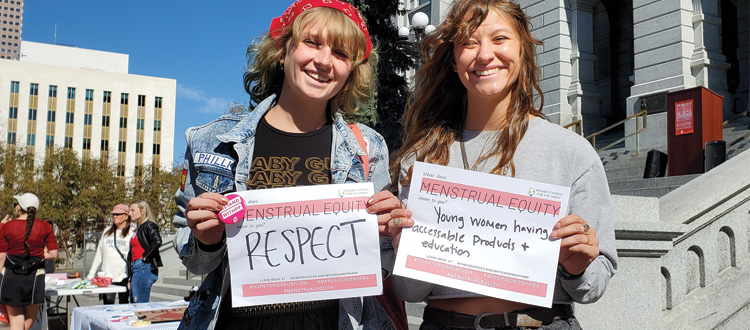Menstrual Equity for All Act will make period products more affordable and accessible!
 Jamie McConnell Deputy Director |
Congresswoman Grace Meng has reintroduced the Menstrual Equity for All Act to help make menstrual products more affordable and accessible. The menstrual equity movement works to ensure that anyone who menstruates has the right to access safe, affordable products, and know exactly what ingredients they are being exposed to in the products.
Everyone who menstruates has the right to products, like tampons or pads, that they need to control their flow. Yet in the United States many are forced to suffer through their periods without safe period care products, resulting in the use of substandard materials like newspapers, toilet paper, and rags/clothes. Shockingly, almost 1 in 4 teenagers report lacking access to period products. During COVID-19, 1 in 10 college students were unable to afford period products. While menstrual products are usually made available in school bathrooms, students are charged for them, putting these necessary items out of reach for some people.
People who are incarcerated may not have access to menstrual products, and if they do, they might not be able to afford the cost of tampons/pads sold in the commissary (according to federal bureau of prisons commissary “shopping” list two tampons can cost $5.55). A 2015 study found that over half of menstruators did not have enough pads to manage their periods. People who menstruate while incarceration are also submitted to humiliating treatment such as having to show male guards their bloody pads in order to receive new ones, having to wear soiled clothing, or being forced to perform “sexual acts” in order to receive a pad.
The affordability of menstrual products is also impacted by the “tampon-tax.” Twenty-eight states still consider menstrual products “luxury items” and impose a tampon tax — while at the same time items like chapstick, dandruff shampoo and other items are tax free! Meanwhile, public health and nutritional programs don’t cover purchases of menstrual products, and are not an allowable expense in the budgets for school, and homeless and domestic violence shelters.
The Menstrual Equity for All Act would address these issues by:
- Allowing states to use federal grant funds to provide free menstrual products in schools
- Providing incentives for colleges and universities to establish pilot programs for free menstrual products on campus
- Providing guidance on the distribution of free menstrual products in federal, state, and local prisons
- Giving homeless providers the ability to use grant funds to cover menstrual products
- Requiring Medicaid to cover the cost of menstrual products
- Requiring any company with a 100 or more employees to provide menstrual products free of charge, in addition to all federal buildings
We can’t choose whether or not we get a period. Period products are not luxury items—they are an essential necessity, and there are severe consequences if people don’t have what they need to properly take care of their period health. We can stand up and raise our voice to ensure that everyone who does get a period has the right to affordable, accessible, and safe period products.
So TAKE ACTION NOW to support the Menstrual Right to Know Act!




It amazes me that we have less rights here in the United States then most countries when it comes to companies disclosing possible ingredients that can be harmful. First of all any company that is creating a product for to use, whether to wear, to put on or against your skin, eat, drink and even inhale etc. That company should have to disclose everything about that product including the bottling as well. Secondly, if any ingredient is known to be carcinogenic, should not be allowed in the product or in its bottling. Putting a law that says, well they should at least have to disclose it, is not enough! How many of us truly read the back of a label each and every time? I know that I try to but let’s face it, not all the time and some items I wouldn’t even think to look at the label, like sanitary napkins. To find out that there’s a company that’s been creating sanitary napkins with carcinogenic products in there sanitary napkin and low and behold I use this product. I’m so saddened by this.